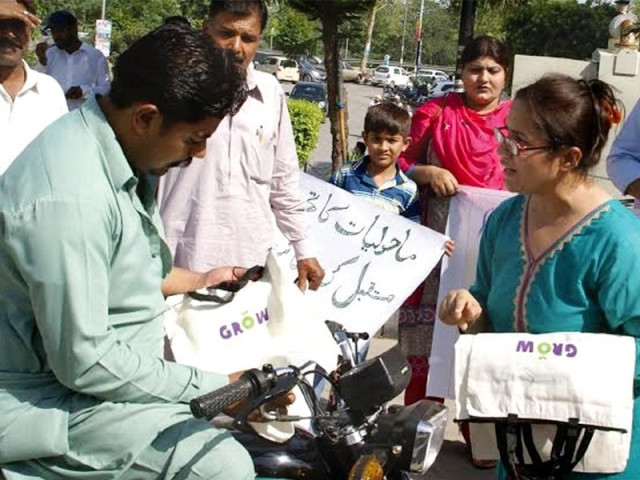World Environment Day: Speakers encourage use of cloth, biodegradable bags
Nearly 90% of debris in our oceans is plastic, which cause over 100,000 marine animal deaths every year.

Activist of an NGO distribute cloth bags to promote environment friendly practices at Jinnah Avenue. PHOTO: EXPRESS
Plastic bags don't biodegrade, they photo degrade — breaking down into smaller and smaller toxic bits contaminating soil and waterways and entering the food web when animals accidentally ingest them.
These views were expressed by environmental activists here on Thursday during an awareness raising stint on the eve of World Environment Day (WED), said a press release. The event was organized by Indus Consortium.
Nearly 90 per cent of the debris in our oceans is plastic, which cause over 100,000 sea turtle and other marine animal deaths every year when animals mistake them for food.
The organisers distributed 500 environment-friendly, biodegradable shopping bags among the passersby in the commercial district of federal capital, Blue Area. The Theme of this year’s WED is “Raise Your Voice, Not the Sea Level”.
Indus Consortium’s National Coordinator Hussain Jarwar said that there is a need to raise awareness among the masses about a ban imposed by the government with heavy penalties on the manufacturing of plastic bags, their distribution and supplies with long-term policies.
Despite scorching heat on a hot Islamabad afternoon, citizens took keen interest in the awareness raising stint and appreciated organizers efforts of reminding them a forgotten tradition. “I fondly remember that in my youth, we used cloth grocery bags when going to the market,” said Zuhra Khan, 55, a housewife. “After this reminder, I will start reviving that environment-friendly tradition,” she vowed.
Fiza Qureshi said that plastic bag litter has become such an environmental nuisance and eyesore that Ireland, Taiwan, South Africa, Australia, and Bangladesh have heavily taxed the totes or banned their use outright. Several other regions, including England and some U.S. cities, are considering similar actions. “We need to have similar legislation here in Pakistan.”
Ashok Lilani, Indus Consortium’s Climate Change Campaign manager, informed the audience and media gathered there that a plastic bag can take between 400 to 1,000 years to break down.
Ashok hopes people will begin to realise that paper and plastic bags both come at great cost to the environment and instead of scratching their head when asked which type they prefer, they will pull a tightly packed reusable bag from their pocket. "We want to make it cool to carry reusable shopping bags," he concluded.
Published in The Express Tribune, June 6th, 2014.



















COMMENTS
Comments are moderated and generally will be posted if they are on-topic and not abusive.
For more information, please see our Comments FAQ